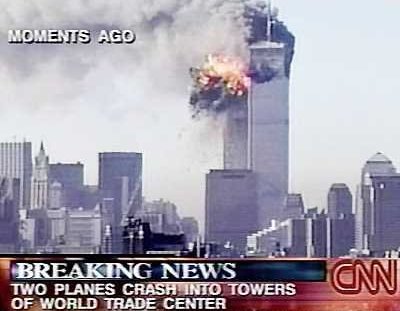
A GeoCities Featured Page



Photographs used here taken from The Age Gallery, September 12th., 2001
|
It takes, one is told, 12 hours for a tsunami to cross the Pacific. Cut off a dinosaur's tail, legend has it, and it will scream half an hour later. So it is with the traditional book trade. After September 11, in every editorial office in the world, publishers huddled together to commission their "instant books" on the big event.
They will be, of course, anything but instant. That deluge of reading matter will crash down on us from Easter 2002 onwards. One can see it coming: a wave of top-of-the-head schlock rippling unstoppably towards us. Destruction, Deconstruction and Islamophobia, by Professor Dryasdust. They will have one thing in common: they will be stale on arrival. Last year's news
In his 1999 book, Faster, James Gleick argues that the word to describe the present age is "acceleration". Whether this means that in 2002 we live more, or merely live quicker, is a question for the philosophers. But Gleick is clearly correct: we're hurtling through the red zone of history.
Like everything else, the printed word has had to adjust to the speeding tempo of modern times - our "hurry sickness", as it is sometimes called. The "weeklies" which dominated current affairs in the 1940s and 1950s (when the circulation of the New Statesman and Tribune were 100,000 plus) have been eaten up by the daily newspaper supplements. Papers are under threat from daily TV news programmes, and the nightly ding-dong News at Ten bulletins are in turn under threat from the 24-hour rolling news programmes with their 15-minute updates.
And all of the above are under threat from the internet and its instant news, so recent you can smell the cordite. As McLuhan pointed out 30 years ago, medium transforms content. It took one epochal news event, the Monica Lewinsky circus (as told on Matt Drudge's underground gossip website), for the internet to change the ground rules of contemporary journalism. It may be that one catastrophic historical event - the destruction of the twin towers in what is, culturally, the centre of the English-speaking world - will do the same for book publishing.
And publishing could do with a boot because, oddly enough, while everything else has got faster, the manufacture of books has, particularly in the last decade, slowed down.
There are exceptions.
On one level, 09/11 8.48am looks like a spontaneous reaction of the kind that led bereaved New Yorkers to plaster city walls with posters, advertising missing loved ones or mourning their loss. But this book has been subjected to stringent editing; it's not a web jamboree. It's a "made" thing, not a happening. The result is not something merely "fast", in Gleick's sense. It is something complete - more complete (because truer to the event) than if it arrived next Easter.
The "creators" (as they label themselves) were Ethan Casey, editor of the electronic journal Blue Ear, and Jay Rosen, chair of the NYU journalism department (a few hundred yards from Ground Zero). They have functioned like conductors of an orchestra, blending others' talents into unity. One is obliged to think analogically, because there has been nothing quite like this before. The big question, of course, is: does 9/11 8.48 am represent a paradigm shift, as Thomas Kuhn called it, or is it a "one-off" - as unique as the outrage that inspired it?
What other new developments can one foresee - assuming that the parameters have indeed altered?
It is symptomatic of the changes afoot that the judges of the Guardian First Book Award should have chosen Chris Ware's Jimmy Corrigan: The Smartest Kid on Earth as their winner this year.
Reading Ware's book (viewing it?) was, I found, an odd kind of experience.
Why, one wonders, did the judges choose Jimmy Corrigan?
Ware's is the sort of book that seems ideally suited to an afterlife on the world wide web, which was invented by scientists at CERN because they wanted to have a kind of virtual running conference in which they could exchange, at high speed, not just text, but illustrations too. It was a new technology for new times; but whether it will have an effect on "literature", as previously perceived, is an open question
Clearly, there will be no web-generated instant War and Peace. Two: everyone there is in reach of everyone else who is there."
This recalls Walter Benjamin's paradox. The novel, Benjamin observed, represented the "death of storytelling". Why? Because the novel is generically fixed. Huge academic resources are devoted to establishing the "texts" of our literature immutably. Secondly, the novel is "commodified"; its fixity is protected by all the fearsome resources of commerce. One can't know what the long-term effects of September's events will be on patterns of book production, distribution and consumption. My guess is that the communally generated and circulated story (in the journalistic and the literary sense) will, again, become a dominant genre.
The British book trade, meanwhile, is in need not so much of a radical shakeup (there have been too many of those) as of intelligent streamlining. We need fewer, better books than the 120,000 currently published each year. More should be invested in quicker and better desk-editing. Above all, new technologies should be used to speed things up.
What books do best is to express a society's sage reflection - its best and most creative thinking in its best-written form. It is something that Britain has always done extremely well, from Caxton onwards. But a little bit quicker, if you please.
..

|


 Please mail any comments and suggestions to:
robin_knight@bigfoot.com
Please mail any comments and suggestions to:
robin_knight@bigfoot.com